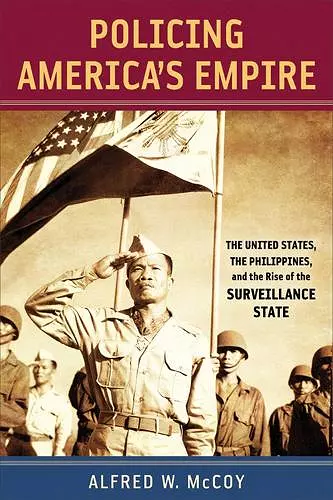Policing America's Empire
The United States, the Philippines, and the Rise of the Surveillance State
Alfred W McCoy author Alfred W McCoy editor Thongchai Winichakul editor RAnderson Sutton editor
Format:Paperback
Publisher:University of Wisconsin Press
Published:30th Oct '09
Should be back in stock very soon

At the dawn of the twentieth century, the U.S. Army swiftly occupied Manila and then plunged into a decade-long pacification campaign with striking parallels to today's war in Iraq. Armed with cutting-edge technology from America's first information revolution, the U.S. colonial regime created the most modern police and intelligence units anywhere under the American flag. In ""Policing America's Empire"" Alfred W. McCoy shows how this imperial panopticon slowly crushed the Filipino revolutionary movement with a lethal mix of firepower, surveillance, and incriminating information. Even after Washington freed its colony and won global power in 1945, it would intervene in the Philippines periodically for the next half-century - using the country as a laboratory for counterinsurgency and rearming local security forces for repression. In trying to create a democracy in the Philippines, the United States unleashed profoundly undemocratic forces that persist to the present day. But security techniques bred in the tropical hothouse of colonial rule were not contained, McCoy shows, at this remote periphery of American power. Migrating homeward through both personnel and policies, these innovations helped shape a new federal security apparatus during World War I. Once established under the pressures of wartime mobilization, this distinctively American system of public-private surveillance persisted in various forms for the next fifty years, as an omnipresent, sub rosa matrix that honeycombed U.S. society with active informers, secretive civilian organizations, and government counterintelligence agencies. In each succeeding global crisis, this covert nexus expanded its domestic operations, producing new contraventions of civil liberties - from the harassment of labor activists and ethnic communities during World War I, to the mass incarceration of Japanese Americans during World War II, all the way to the secret blacklisting of suspected communists during the Cold War.
This forceful book lays the Philippine body politic on the examination table to reveal the disease that lies within - crime, clandestine policing, and political scandal. But McCoy also draws a clear line from Manila to Baghdad. - Sheila S. Coronel, Stabile Center for Investigative Journalism, Columbia University ""In this stunning book, McCoy reveals how empire shapes the intertwined destinies of all involved in its creation. Written with deft strokes, this is an instant classic of historical writing."" - Lloyd Gardner, author of The Long Road to Baghdad: A History of U.S. Foreign Policy from the 1970s to the Present
ISBN: 9780299234140
Dimensions: 229mm x 165mm x 41mm
Weight: 936g
672 pages